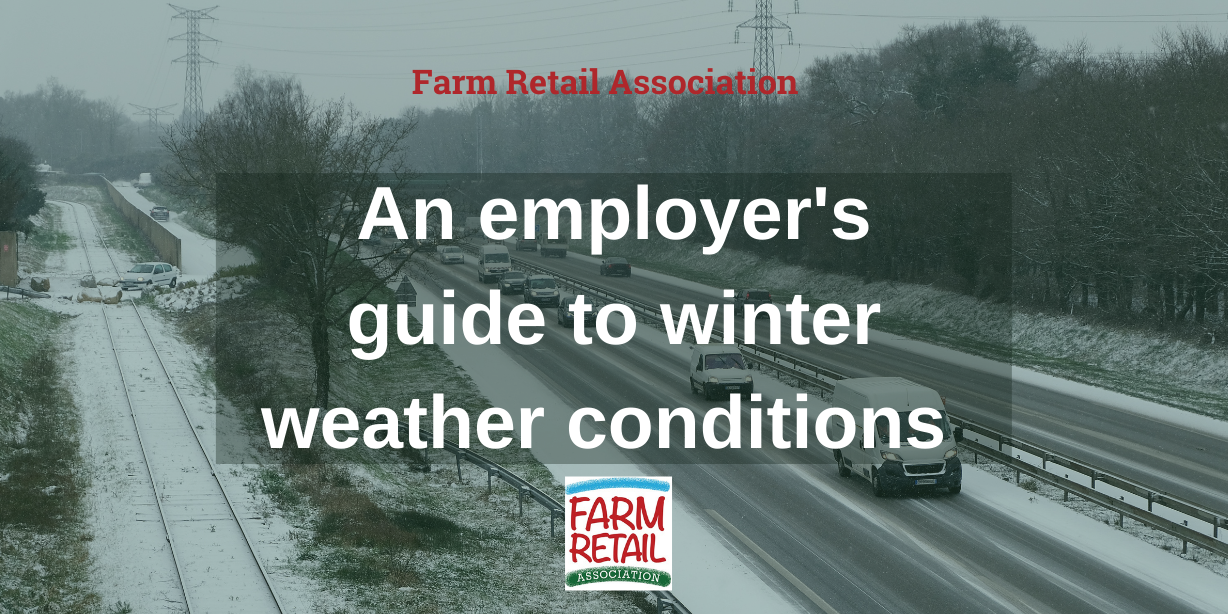An employer’s guide to bad weather conditions in 2022
With the Christmas festivities becoming a distant memory the dark nights may be starting to rescind but it’s safe to say the poor weather is likely to stay for a bit longer. Everyone will recall the storms that battered us in December and caused power outages, the historic flooding across Europe, and the hottest days on record over the past few years, it is safe to say that adverse weather is something that all businesses will need to prepare for.
Regardless of weather resulting in catastrophic flooding, unsafe travel conditions, damage to buildings or infrastructure or working conditions that are too hot or too cold every business needs to be aware of their obligations to the staff and what they can do to help mitigate the damage to the business.
How should I know if employees are using the bad weather as an excuse to not come to work?
When traveling to work is made more difficult than usual for employees due to weather conditions employers should take a common-sense approach when considering the expectation of employees attending work.
When considering whether employees are using the bad weather conditions as an excuse not to attend work employers should take account of any official travel advice, the Environment Agency, Met Office, and of course, reputable news outlets will provide updates as to any localised weather warnings.
Of course, despite localised weather warnings there can be local variations and each of the employee’s circumstances should be taken into account. or example, an employee who walks uphill to work may struggle on icy footpaths, whereas an employee in a 4×4 who drives a short distance on gritted roads would face a very different commute. Different expectations could of course be applied to the second employee.

Do I have to pay employees unable to get to work because of the bad weather?
Where a workplace remains open, there is no statutory obligation to pay employees who do not attend work due to adverse weather. If however there are contractual obligations, an implied term or an established custom and practice there could be such an obligation.
There is an argument to suggest that continuing to pay employees will promote staff morale and loyalty however employers should ensure that they confirm that any payment is discretionary.
Where possible, employers should consider alternative working arrangements such as working from home, varying shift allocations, or start and end times. In retail settings this can be difficult but where possible these options could be considered.
What if I have to close my business premises?
Where you are forced to close your business due to adverse weather you should be aware that unless the relevant clauses are in place you will be obligated to pay staff their usual pay. As a general rule of thumb, where an employee is ready and willing to work but they are prevented from doing so by their employer they are entitled to full pay, employers can of course rely upon their right to lay-off or move to short-time working should they have the contractual right.

Short time working and lay off
Our lawyers always advise clients to include lay-off and short-term working clauses in their contracts of employment. Where a business cannot provide work to an employee lay-off or short-time working are temporary measures to mitigate the risk to the business.
Where employees have not been provided with any work they can be laid off on a temporary basis, this is usually one week at a time.
Where an employee has been laid-off they could be given some hours to complete and would be considered as being on short-time work.
Where a contractual right to lay-off without pay is invoked, employees are not entitled to be paid for the time not worked, they may be entitled to a statutory guarantee payment from HMRC however.
Lay-off and short-time working are not cure-alls, they are time-limited and need to be used properly, please take specific advice from your lawyers if you need to lay-off staff or rely upon short-time working.
Annual leave is vital to promote good physical and mental health in the workplace and will improve employees work-life balance. It allows individuals to take time to rest and re-energise which can result in stress reduction and improve mood, benefiting staff morale. For more information on annual leave, click here
How do I manage staff arriving late or wanting to leave work early because of the bad weather?
Employees should be clear that they are expected to take all reasonable steps to attend work and that the usual absence reporting procedures apply. If you are unaware of having an absence management policy in place, click here. Where an employee fails to properly report their absence, employers can always rely upon their usual enforcement procedures, for example, informal words of advice or the disciplinary process. It is of course worth remembering that extreme weather events can change quickly. Often, employees are suffering their own personal devastation, perhaps in the event of a flood, or are trying to arrange child care, it could seen as harsh if an employer was to rely upon the formal procedures.
Employers can of course rely upon their redress under their Absence Management Procedure for any lateness or absence but should take into account the employees individual circumstances and any disabilities that could make travel to work even more difficult.
School closures or other childcare issues
In the event that adverse weather affects usual childcare arrangements, for example, the closures of schools or nurseries, parents may find it difficult to attend work, particularly in the current public health climate.
Employees are entitled to take unpaid time off to care for dependants and this right will apply where unforeseen circumstances cause a breakdown in childcare arrangements, this is however restricted to only as much time as is necessary to make alternate arrangements.
Do I need an adverse weather policy?
It is probably unlikely that you will be able to formulate a plan for all eventualities, whether there are power outages, extreme snow or flooding, storms that have caused damage to your business or extreme heat adverse weather can have a whole range of consequences. It could be sensible to have a general backup plan in order to minimise disruption and to further help enforce your duty of care.
If your contracts and handbooks have been drafted or reviewed by your lawyers here at Employment Law Solutions they will have ensured as many eventualities as possible will have been dealt with without bogging you down in policies and paperwork.
Employment Law Solutions can help
If your business is affected by adverse whether in 2022 your lawyers at Employment Law Solutions remain on hand to ensure that your HR headaches are cleared up with as much ease as possible letting you focus on getting your business back to normal.
Employment Law Solutions offer Employment Law advice and can assist with your contracts and handbooks. By offering a monthly retainer service you are able to benefit from legal advice and employment contract reviews 24/7, 365 days, all while spreading the cost over 12 monthly payments.





